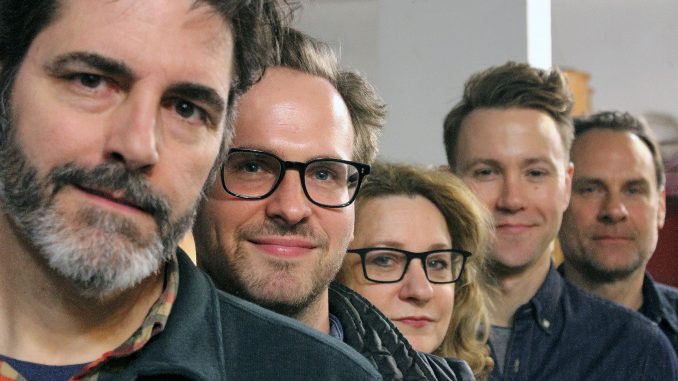

Pictured (left to right): Director Carl Andress, Playwright Tim Pinckney.
Photo Credit: Courtesy of Still at Risk
This city is old enough to remember. And, thankfully, Tim Pinckney’s Still at Risk, a play about the activists who fought for change during the early onset of the AIDS crisis, refuses to let us forget. I came to New York in the late 70’s, just a few years before the first AIDS cases started to appear, before the disease even had a name. Before, as Risk so wrenchingly points out, local and federal officials had something to pointedly and unforgivably ignore. To neglect. To fail to fund a possible cure for. “If this fucking disease had found its way into straight white Republican men first, it would have been cured in a week. They wanted us dead,” one of the characters in Risk says.
In response, a small group of New Yorkers forms ACT UP, which was something new for its time: a group as devoted to calling out the hypocrisy of a government of, for, and by the people, as it was to providing life-determining support services for those afflicted with AIDS. Risk picks up the story some 15 years later. In setting his play at midpoint in the disease’s history, halfway between its inception in the early 80’s and the present day, Pinckney presciently—and with a deep-seated sense of humanity—pivots between looking back at a harrowingly dark period in our country’s history and layering the play’s current time-setting (the early 2000’s) with eerily foreboding warnings. As Pinckney told Splash magazines in a recent interview, “It’s important for this part of history to be discussed.” He recalled meeting with an audience of LGTBTQ students in San Francisco, shortly after the Parkland massacre, who told him, “We are living in a time where our friends are being killed and the government is sitting back and doing nothing. We understand the story of this play very well.”

Pictured: Set renderings by Jason Lee Courson.
Photo Credit: Courtesy of Still at Risk
A big part of what makes Still at Risk so appealing is Pinckney’s stripping away of the social and political layers to reveal the personal: the varied, complex human beings striving beneath. The characters in his play are fully dimensional: passionate, driven, flawed, authentic. They are also tirelessly funny. “I fell on my way here and stopped at a friend’s to borrow something to wear,” Kevin, a former ACT UP volunteer, says, explaining to an old acquaintance, Susan, the reason for his attire. To which Susan replies, “Your friend Hannah Montana?” Susan, herself a former activist who once shaved her head, pierced her nose, and dated women, but who now had a daughter with a male ACLU lawyer, continues, “You’re sort of dressed like a woman.” To which Kevin says, “What’s more surprising is so are you.”

Pictured (left to right) : Robert Gomes, Ryan Spahn, Amy Hohn,
Jonathan Walker, Christopher J. Hanke.
Photo Credit: Courtesy of Still at Risk
In the late 80’s, my wife was close friends with a funny, smart, charismatic coworker who taught English as a Second Language, as did she. Both were also pursuing careers in the performing arts. By the time I met my wife and her friend, Chico, in the early 90’s, he had already been diagnosed as HIV-positive. When I visited him in the hospital, shortly before he died, his once dark, flowing head of hair was gone, and beneath his white gown, his body seemed sizably shrunken. My wife and I talked of the greater waste, the terrible, unimaginable loss: the 40 or 50 years denied Chico for no good, earthly reason.
It was through the efforts of ACT UP, and organizations like it, that people diagnosed with HIV, people like Chico, are no longer handed the immediate equivalent of a death sentence. As Susan herself says, “Everyone isn’t dying constantly. And isn’t that exactly what we hoped for? For it to be easier, so no one would ever go through again what we went through. ‘Memo to Everyone currently living on Planet earth – You’re welcome.’”

Pictured (left to right: Jonathan Walker, Amy Hohn, Robert Gomes,
Ryan Spahn, Christopher J. Hanke.
Photo Credit: Courtesy of Still at Risk
Yet the work is far from finished. According to HIV.gov more than a million people in the U.S. still have the HIV virus. About 15 percent are unaware of even being infected. And, in a larger sense, the fight against all forms of intransigent prejudice, negligence, and hate continues. “With the insanity that is currently sitting in our White House,” Pinckney notes, “it’s imperative that we use our voices and speak out, march, write, talk to our colleagues and neighbors. We have the power to bring about great change. We have done it before, many times. And we will do it again, very soon.”

Still at Risk. Presented by Theater for the New City, 155 First Avenue, New York, NY. In association with MBL Productions. By Tim Pinckney. Directed by Carl Andress. Featuring Robert Gomes, Christopher J. Hanke, Amy Hohn, Ryan Spahn, Jonathan Walker. Scenic Design: Jason Lee Courson, Costume Design: Gregory Gale, Lighting Design: Steve O’Shea, Sound Design: Adrian Bridges, Production Stage Manager: Christopher Flores, General Manager: Tony Spinosa, Company Manager: Greg Santos, Press: Philip Carruba, Richard Hillman Public Relations.
Performances are Tuesday through Saturdays at 8:00 p.m., and Sundays at 3:00 p.m., through March 31. Tickets are $25 and may be purchased online at SmartTix.

Be the first to comment